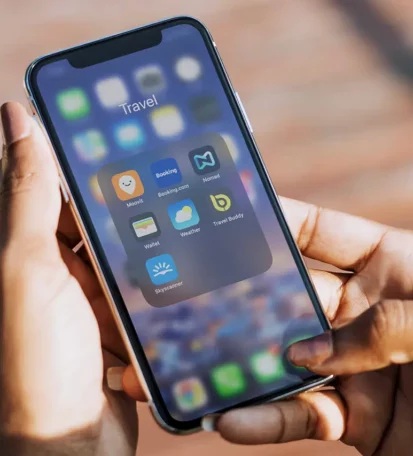Business Travel Guide
Maintaining Work-Life Balance While Traveling for Business

Navigating work-life balance is challenging enough without the added complexity of frequent business travel.
With new time zones, unpredictable schedules, and constant connection demands, the business traveler’s lifestyle can make “balance” feel more like an elusive dream than an achievable goal.
Yet, finding this balance is crucial, not only for mental well-being but for overall productivity.
For business travelers, who may spend one-third or more of their year on the road, establishing a strong sense of stability between work demands and personal time can make all the difference.
What Is Work-Life Balance?
Work-life balance can be seen as a state where individuals manage their work and personal time effectively, without one overshadowing the other. Studies reveal that employees who feel in control of their work-life balance are more satisfied and productive.
In fact, a recent survey showed that 60% of employees believe their employers should provide better options to achieve this balance, a significant statistic that reflects growing awareness.
For frequent travelers, this is doubly important, as they’re often away from the comfort of their usual routines and home support.
1. Set Clear Boundaries
Boundaries form the cornerstone of a healthy work-life balance, particularly when you’re away from home and immersed in a business trip. Define work hours that suit your schedule and ensure colleagues are aware of your availability.
Clearly designate time for work tasks and personal relaxation so one doesn’t encroach on the other. There are many tactics and strategies for achieving balance, one of the interesting ones is using a call recording app.
After installing Call Recorder for iPhone, you can record work calls at a time when you are unavailable and listen to them while you work.
Thanks to the call recorder, you will not lose important information and will not allow work to intrude into your personal life. In short, this tactic allows you to focus on your personal time and review work conversations at your convenience.
2. Prioritize Physical and Mental Wellness
Physical activity and mental relaxation are both critical, especially when traveling. Studies show that individuals who regularly exercise are 15% more productive in their work.
Opt for hotels that offer fitness centers, or use free apps for hotel room workouts.
A simple morning workout or evening walk can significantly reduce stress and boost your productivity.
Similarly, meditation apps or journaling before bed can help you decompress after a long day.
3. Stay Connected with Family and Friends
Connecting with loved ones can help maintain a sense of normalcy and emotional support. Use video calls, messaging, or even social media to keep up with family events and friends.
It doesn’t need to be long; even short connections can be grounding and make you feel more at home.
4. Incorporate Leisure into Your Travel Schedule
One of the best ways to maintain balance during business trips is to schedule personal time for exploring your travel destination. This is a simple concept, yet it’s often overlooked.
Studies show that 70% of business travelers feel happier and more satisfied if they can incorporate leisure activities into their trips.
Even an hour or two for sightseeing, trying a local dish, or enjoying a scenic view can relieve stress and refresh your mind for work.
5. Limit Connectivity and Screen Time
While technology keeps us connected, too much connectivity can erode personal time. As a business traveler, it’s easy to feel the pressure to be “always on,” particularly when work colleagues are in different time zones.
Instead, set clear digital boundaries. Silence notifications during personal time, and establish a cutoff time for emails and calls.
Allow yourself time to unwind without the constant ping of work-related messages.
6. Plan Downtime and Stick to It
In the rush of meetings, presentations, and conferences, it’s easy to sacrifice rest. But downtime should be as scheduled as work meetings.
According to studies, adults need 7-9 hours of sleep for optimal cognitive function, yet many business travelers get far less.
Plan rest, relaxation, and sleep as part of your travel itinerary. The benefits are numerous: with better sleep, you’ll not only handle stress more effectively but also improve decision-making and productivity.
7. Use Call Recorders for Stress-Free Conversations
Traveling often requires frequent calls with clients, supervisors, or team members. Missing key points or struggling to recall a conversation can add stress to an already demanding travel schedule.
This tool can be especially beneficial when managing multiple time zones, enabling you to replay and re-listen to calls instead of staying up late to process information.
8. Adopt a “One Task at a Time” Approach
When in unfamiliar environments, it’s easy to lose track of focus. Multitasking might feel necessary, but studies show it can reduce productivity by as much as 40%.
Rather than juggling multiple tasks, concentrate on one thing at a time, whether it’s a meeting, presentation, or catching up on emails.
Taking this approach can simplify tasks and reduce mental strain, ultimately leading to a more balanced, less chaotic day.
Conclusion
Maintaining work-life balance while traveling for business is no small feat, but it is achievable with intentional strategies. It’s about setting boundaries, prioritizing wellness, and making the most of both work and personal time.
By following these steps and leveraging helpful tools, such as call recorders to manage conversations more efficiently, business travelers can balance their responsibilities without sacrificing their well-being. Finding balance may take practice, but ultimately, it leads to a healthier and more fulfilling travel experience.




